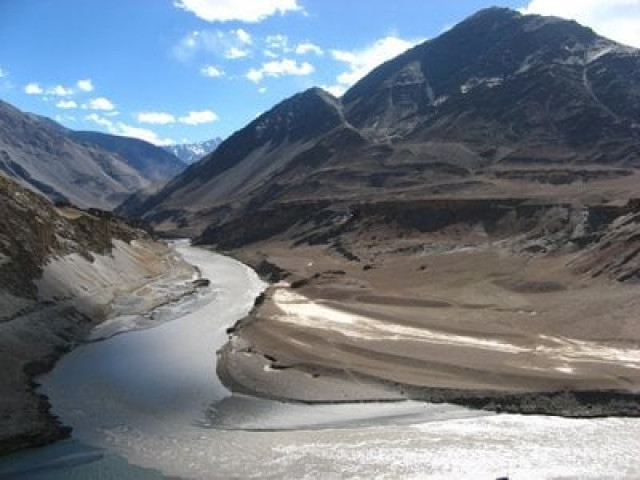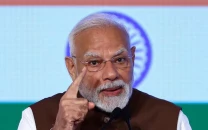The Indus Standoff
The writer is a lawyer based in Islamabad.

India, Pakistan’s all weather foe, has once again resorted to blaming Pakistan for its own security lapses. At this point, Pakistan has become India’s go-to scapegoat. While the incident in Pahalgam was undeniably tragic, India’s attempt to exploit the tragedy to further its long-standing desire to wriggle out of the Indus Waters Treaty is disgraceful.
India has previously expressed its discontent—and even intent to no longer comply with the treaty—both implicitly and explicitly on several occasions. It sent notices to Pakistan in 2023 and 2024, seeking modifications in the treaty. Back in the day, PM Modi would often make statements like: “Blood and water cannot flow together.” Now, it seems, India has finally acted on that discontent, though it's also clear that it is treading carefully—almost confused—about how to frame this move. Their official statement, delivered by Foreign Secretary Vikram Misri, used the word “abeyance”: ‘The Indus Waters Treaty of 1960 will be held in abeyance with immediate effect until Pakistan credibly and irrevocably abjures its support for cross-border terrorism.’ Meanwhile, Indian media is using the word “suspension.”
Both terms point to a temporary halt or pause in implementation. This careful language suggests that even India knows the weight of unilaterally suspending a bilateral treaty—especially one widely seen as a rare and enduring example of cooperation. No country wants to be seen as one that doesn’t abide by treaties. It wouldn’t be an exaggeration to say that India is testing the waters—quite literally and metaphorically.
India may have made the move, but the question remains: can it really do that? Short answer—no. Long answer—still no. The Indus Waters Treaty has no sunset clause, no expiry date, and no provision for unilateral suspension or termination by either India or Pakistan. What it does have—spelled out in no uncertain terms—is Article XII, which states that the treaty can only be “modified” or “terminated” through mutual agreement between the two governments. Neither party can walk away on its own. This makes the treaty perpetual—binding unless both countries explicitly agree in writing to end it.
What India likely believed was a clever maneuver—a temporary freeze—only underscores the fact that it cannot lawfully alter or end the treaty on its own. Any such move would constitute a violation. So India can tell itself whatever it wants—but it remains bound, and the treaty is in no way suspended.
Moreover, the Vienna Convention on the Law of Treaties—the primary international instrument codifying the rules governing agreements between sovereign states—clearly states that unilateral suspension of treaties is not allowed unless the treaty itself explicitly permits it, or if both parties agree to the suspension. The only exception is in the case of a material breach of the treaty by one of the parties, and Pakistan hasn’t come anywhere close to breaching it. So even that line of argument is legally flawed for India.
This dramatic move has sparked a significant concern: can India actually stop the flow of water to Pakistan? The reality is—no, not entirely. India currently lacks the infrastructure to completely halt or permanently block the flow of water from the Indus river system. While it has constructed hydroelectric and dam projects like Kishanganga and Ratle on some of the tributaries, these only allow limited control through regulated releases. They can reduce water flow temporarily, but not stop it altogether. And building the kind of infrastructure needed to significantly control or cut off water flow would take years—if not more.
So far, Pakistan has responded with measured resolve. The National Security Committee has declared that any attempt by India to divert or block the flow of water will be treated as an “act of war.” In a decisive and audacious move, Pakistan has immediately ceased all trade with India and closed its airspace. While this has shown Pakistan’s readiness to deal with any hostile situation, the focus now shifts to how it will take up the matter on the international stage. The issue should be raised before the World Bank—the original broker of the Indus Waters Treaty. Pakistan can pursue legal recourse by framing India’s actions as a dispute and referring the matter to the Court of Arbitration, a dispute resolution mechanism provided within the treaty itself. Doing so will not only reaffirm Pakistan’s commitment to the treaty but also underscore the fact that the treaty remains fully valid and binding.
Ultimately, amid the political noise, one fact remains unshaken: international treaties are made to endure governments, heads of state, and political biases—and the Indus Waters Treaty is no exception. As of now, it remains valid, no matter who sits in Delhi or what prejudices they may carry.



















COMMENTS
Comments are moderated and generally will be posted if they are on-topic and not abusive.
For more information, please see our Comments FAQ